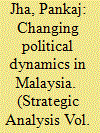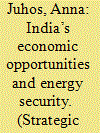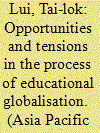|
|
|
Sort Order |
|
|
|
Items / Page
|
|
|
|
|
|
|
| Srl | Item |
| 1 |
ID:
084896


|
|
|
|
|
| Publication |
2009.
|
| Summary/Abstract |
The 12th Malaysian general elections have been significant in more ways than one. Most importantly, the opposition unity combined with the grievance vote of the ethnic minorities challenged the United Malays National Organisation hegemony long prevalent in Malaysian politics. The Bersih rally and Hindraf agitation that saw large-scale mobilisation before the elections also points to the active participation of civil society. The socio-economic marginalization of the ethnic minorities, erosion of religious rights, corruption, and unemployment accelerated such a change in the political scenario. This paper looks into different facets of the changing political dynamics in Malaysia and the role of ethnic minorities. It also looks into the policy options before India with regard to ethnic Indians in Malaysia.
|
|
|
|
|
|
|
|
|
|
|
|
|
|
|
|
| 2 |
ID:
134151


|
|
|
|
|
| Publication |
2014.
|
| Summary/Abstract |
Allowing or restricting foreign movement is a crucial policy choice for leaders. We argue that freedom of foreign movement reduces the level of civil unrest under non-democratic regimes, but only in some circumstances. Our argument relies on the trade-offs inherent in exit and voice as distinct strategies for dealing with a corrupt and oppressive state. By permitting exit and thereby lowering its relative costs, authoritarians can make protest and other modes of expressing dissatisfaction less attractive for potential troublemakers. Liberalizing foreign movement can thus function as a safety valve for releasing domestic pressure. But the degree to which allowing emigration is an effective regime strategy is shaped by the economic opportunities offered by countries receiving immigrants. We find that freedom of foreign movement and the existence of economic opportunities abroad reduce civil unrest in non-democratic states. However, at high levels of unemployment in the developed world, greater freedom of foreign movement actually increases protest.
|
|
|
|
|
|
|
|
|
|
|
|
|
|
|
|
| 3 |
ID:
140899


|
|
|
|
|
| Summary/Abstract |
It has been extensively debated whether India should prioritise relations with its immediate or extended neighbourhood. Put into the framework of energy security and competition with China, it will be argued that the recently signed South Asian Association for Regional Co-operation (SAARC) framework agreement can provide the basis and open up new opportunities for inter- and sub-regional energy co-operation in Asia. Furthermore, besides concrete proposals, such as a two-track process within SAARC, it will also be suggested that in order to successfully extend this framework and tackle the region’s energy dependence, India should embark on the development of triangular foreign policy strategies, connecting Iran, Russia, Japan and the United States with its immediate neighbourhood more significantly.
|
|
|
|
|
|
|
|
|
|
|
|
|
|
|
|
| 4 |
ID:
134159


|
|
|
|
|
| Publication |
2014.
|
| Summary/Abstract |
With the rise of Asian economies, university education in the region is no longer just a service to be consumed domestically. It is also perceived as an industry for a rising global city. How to capture the growing market and make the best use of such an opportunity for city building is now on the agenda of many cities in Asia. Hong Kong is a particularly interesting case as it is both a destination for many talented students from China and a bridge for international students to reach different parts (China in particular) of Asia. Educational globalisation seems to make sense politically as well as economically. Yet how to strike a balance between opening the door of universities to the outside world and meeting the education needs of the local population is by no means unproblematic. At stake are further changes in the universities, and major challenges to the political capacity of the government which has to turn higher education into a revenue generating service without doing it at the expense of local interests.
|
|
|
|
|
|
|
|
|
|
|
|
|
|
|
|
| 5 |
ID:
133390


|
|
|
|
|
| Publication |
2013.
|
| Summary/Abstract |
The Arctic, during the Cold War a locus of intense military competition between the United States and the Union of Soviet Socialist Republics, is rapidly reemerging as a geostrategic flash point. As accelerating climate change melts the Arctic's perennial sea ice, littoral as well as peripheral actors are preparing to exploit emergent economic and strategic opportunities in the High North. Although the possibility of armed conflict over Arctic resources has been somewhat discounted, a fair amount of saber rattling in recent years among the "Arctic Eight"-the United States, Russia, Canada, Denmark, Finland, Iceland, Norway, and Sweden-has given rise to the notion that circumpolar security actors may be priming for a "new kind of Cold War" in the North.
|
|
|
|
|
|
|
|
|
|
|
|
|
|
|
|
|
|
|
|
|